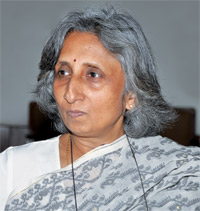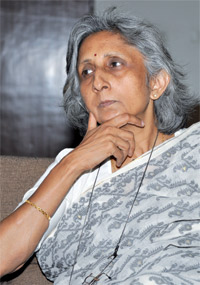 Smt Vibha Puri Das
Smt Vibha Puri Das
Secretary, Department of Higher Education
Smt Vibha Puri Das, Secretary, Department of Higher Education is an IAS officer of the year 1976 batch, Uttaranchal Cadre (then Uttar Pradesh), India. Prior to this posting, she was Additional Secretary, Department of Personnel and Training.
Smt. Das addressed various educational issues and highlighted the Ministry’s initiatives over a tea with Dr. Rajeshree Dutta Kumar
How is your department addressing the partial disconnect between school education system and higher education system and that of higher education and industry’s requirements?
I think, this is the time when we are looking at education in a seamless way, from start to finish, from Right to Education (RTE) through Universalisation of Rashtriya Madhyamik Shiksha Abhiyan, that is, secondary education and towards a huge unprecedented expansion of higher education, so that all of them fit into one comprehensive vision for Education. The fact is that we have huge demographic dividends available to this country and similarly we are going to be well placed in terms of the numbers of primary school leavers and in a few years from now the secondary school leavers who are going to be significantly higher in number than any time in the past. So, we have to be ready with our higher education system to receive the much larger number that is in terms of quantitative dimension. Looking at the qualitative dimension, again the seamless connect is quite evident. The whole issue of Comprehensive and Continuous Evaluation (CCE), and the core curriculum that is cutting across different school boards, constitute an emphasis on quality as well as renewed emphasis on school education. To rededicate ourselves to the importance of schooling and quality of school education has been the dominant feature in the recent past. The Quality Initiatives in the 11th Plan have focused on this dimension. So, we need to factor that when we look into higher education scenario, what are the kinds of kids that we are getting into higher education system? Are they well prepared in the school education? Do they have to face lot of stress in the school education system? Do they have a large number of Entrance Examination and multiplicity of preparatory tests, which they have to go through? Addressing all these issues are an essential feature of how and what kind of kids we get into the higher education system. So, this has been done so far and now we are looking at streamlining and rationalising the tests that are envisioned for the entry to higher education. I think the seamless connect across different segments of education has never been so well articulated as it is today.
|
Smt. Das is an M.A. in Political Science from the Jawaharlal Nehru University. She has also done a Certificate Course in International Approaches to Rural Development and Poverty Alleviation in the Institute of Development Studies, University of Sussex, UK. She has served the Central Government as Joint Secretary, Ministry of Food Processing Industries, and Executive Director, Central Social Welfare Board. Her other postings have included serving as Principal Secretary and Commissioner, Forest and Rural Development, Uttaranchal and Principal Secretary, Home and Transport of Uttaranchal. She has also been Additional Chief Executive officer of the Greater Noida Authority, Vice Chairperson, Ghaziabad Development Authority, and Special Secretary (Finance), Government of U.P. |
Please throw some light on Education reforms that have happened ever since this government has taken hold?
When the present government took office, the Presidential address, to the two houses of parliament in June 09, indicated that we would be coming with a new regulator for higher education. Constituting the National Council for Higher Education and Research (NCHER) has been the motive of entire reform process that ministry has dedicated itself to, over the last two years. In the first 100 days, the action plan, that the Minister set for this ministry, was the working of legislative reforms, polity reforms and the introduction of the schemes, which were necessary in the 11th plan. So, all the three dimensions that ministry really works in, i.e. the legislative sphere, the polity sphere, and the programme sphere, have been targeted in our approach to reforms.
What are the Education reforms that you have taken or introduced?
In broader terms what the ministry is working towards is providing the necessary autonomy to educational institution because higher education institutions have to function in a sphere where they are completely free from any outside or government control whether in terms of their internal administration, their financial autonomy, their academic autonomy. The Academic autonomy has never been in question, they have completely been autonomous. But, steadily we are increasing and empowering them to see that whatever improvements we can do in terms of their financial and administrative autonomy, we should be able to provide. This is in a larger and in broader direction of reform. Secondly, we find that coming from NCHER, the regulatory mechanism needs to be clearly defined so that the space for each setup institution is clear. Educational Institutions have their space, the regulator has its space, the Government has its own space and we all work in our defined arenas. So, it is in this context that the NCHER is envisioned. The other legislations that we have on the unveil is the prevention of the unfair practice, the mandatory accreditations. The foreign education providers, of course, is a different league altogether. It has nothing to do with quality as such within the domestic domain but it is about enhancing the total number, may be quality by extension. So the direction of reforms in the last couple of year has been clearly of autonomy for transparency, for more accountable institutions and for a total academic experience of quality education.
 “The whole issue of Comprehensive and Continuous Evaluation (CCE), and the core curriculum that is cutting across different school boards, constitute an emphasis on quality as well as renewed emphasis on school education”
“The whole issue of Comprehensive and Continuous Evaluation (CCE), and the core curriculum that is cutting across different school boards, constitute an emphasis on quality as well as renewed emphasis on school education”
Please give comprehensive overview of your department’s role on the entire promotion of Gross Enrollment Ratio (GER)?
GER is the function of total number of children in the age group of 18-24 and the proportion of these children who are actually going for enrollment in higher education. It is largely observed that the a large proportion of kids, who complete class 12 , do come into higher education. The number is enhancing at every stage, so the RTE guarantee that many more children qualify at the end of primary school, the secondary education guarantee that many more children qualify at the end of secondary education and therefore, the number is in increasing. Otherwise if you look at it, about 70 percent of the school leavers do get enrolled for higher education but the total number of school leavers still does remain small. So, we need to grow the number in both place and then we need to grow the opportunities available for children to get into higher education.
We have adequate number of hostels so that children do not have to travel too far especially for women as they have problem of travelling in the Indian context, we have special schemes for women hostels. Then, the whole issue of distance Education to ensure that those kids who cannot really afford to attend morning to evening programme of study are able to do it on a flexi time/ anytime learning mode. To my mind the most important mode is technology enabled learning, which is of course the ICT. It is a transforming platform which will reach larger number, enhance quality, and multiply opportunities. So, to my mind these are the different areas where we are looking at growing the numbers.
What are the measures taken to ensure quality education to the larger population? How much of quality are we looking at?
We are certainly addressing the quality dimension as I said earlier right from school onwards into higher education. Within higher education, seeing that the faculties are well qualified, the regulations from University Grants Commission (UGC) have been made stringent. Regulations from All India Council for Technical Education (AICTE) have been changed to ensure that to teach in Engineering College, a doctoral degree is a mandatory. So, the whole minimum threshold criteria for having qualified teacher have been enhanced. The salary structure for teachers has been enhanced so much that it has become one of the most attractive destinations in terms of financial package available to teachers. So, we are trying to make both the living conditions and working conditions better, to improve the compensation package and infrastructure availability.
“all the three dimensions that ministry really works in, i.e. the legislative sphere, the polity sphere, and the programme sphere, have been targeted in our approach to reforms”
Do you think universities should have mandate to produce industry ready knowledge and workforce?
I think industry should not assume that universities have mandate to produce people who are industry ready. Universities have to produce graduates or post graduates based on comprehensive societal perception; it is not about putting up graduates who fit in into the industry requirements. It is not something, which any self-respecting university worldwide would do, because universities are not polytechnic that will be manufacturing employees for the industrial workforce.
They are in the business of producing educated citizenry. Now, from the educated citizenry, it is for prospective employer to see that kids have the basic skills set; what are the add-ons that they need to give to them so that they become industry ready. So, I think that industry would need to invest in Post-Education Training. We cannot clearly have the universities mandated to produce for each and every kind of employer profile. But, at the same time we are trying to make provision ensuring the engineering and professional graduates are equipped with industry ready skill sets. For Education as a whole, I think they need to have a broad canvas in mind.
We have set the target of over 500 million skilled youth by 2020. How are you going about it?
There are no two ways about it. I think scaling of the economy has to be addressed and we are working at it in developing the National Vocational Education Qualification Framework, which will help kids to go laterally, diagonally, vertically, and have multiple pathways of moving from educational to vocational, back to education from vocational and so on. It is going to be the mark of an educated society where kids can learn things, which are relevant for them to get a job and they also have adequate skills to expand the mind and get educated. We are working on the parallel platforms because up to class 8th it is mandatory education for all. But secondary education and beyond can be mixed with skills, polytechnic education so as to see that those numbers are put through into our education. AICTE has improved and modified their regulations to have polytechnic as part of engineering colleges. We have Polytechnic skilling process provided through the digital learning platform so that can be done through remote learning.
I think apart from the expansion in the polytechnic; there is going to be an expansion of at least 1000 new polytechnic over the 11th plan period. Around 300 in the government sector, 300 in Public-Private-Partnership mode and another 400 in private sector. So, total number of at least 1000 extra polytechnic will be set up, which will power the way to skill Enhancement. 





















